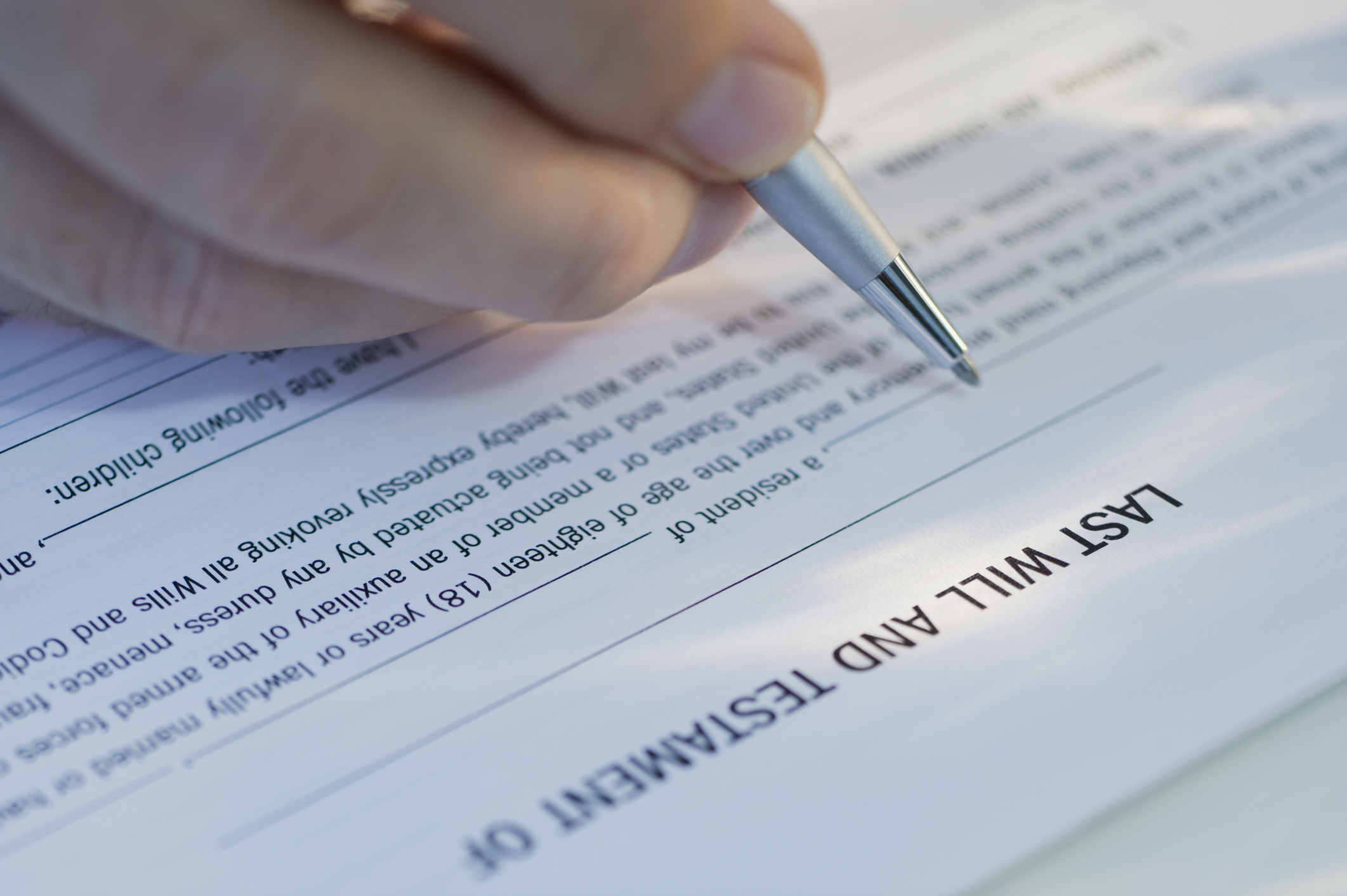5 Avoidable Mistakes in the Will You Write
Do-it-yourselfers need to be careful not to trip over these common hurdles as they craft their own last will and testament.


Profit and prosper with the best of Kiplinger's advice on investing, taxes, retirement, personal finance and much more. Delivered daily. Enter your email in the box and click Sign Me Up.
You are now subscribed
Your newsletter sign-up was successful
Want to add more newsletters?

Delivered daily
Kiplinger Today
Profit and prosper with the best of Kiplinger's advice on investing, taxes, retirement, personal finance and much more delivered daily. Smart money moves start here.

Sent five days a week
Kiplinger A Step Ahead
Get practical help to make better financial decisions in your everyday life, from spending to savings on top deals.

Delivered daily
Kiplinger Closing Bell
Get today's biggest financial and investing headlines delivered to your inbox every day the U.S. stock market is open.

Sent twice a week
Kiplinger Adviser Intel
Financial pros across the country share best practices and fresh tactics to preserve and grow your wealth.

Delivered weekly
Kiplinger Tax Tips
Trim your federal and state tax bills with practical tax-planning and tax-cutting strategies.

Sent twice a week
Kiplinger Retirement Tips
Your twice-a-week guide to planning and enjoying a financially secure and richly rewarding retirement

Sent bimonthly.
Kiplinger Adviser Angle
Insights for advisers, wealth managers and other financial professionals.

Sent twice a week
Kiplinger Investing Weekly
Your twice-a-week roundup of promising stocks, funds, companies and industries you should consider, ones you should avoid, and why.

Sent weekly for six weeks
Kiplinger Invest for Retirement
Your step-by-step six-part series on how to invest for retirement, from devising a successful strategy to exactly which investments to choose.
I have seen my share of client-drafted wills. While most people opt to have a lawyer draft their last will and testament, there is no requirement that an attorney do so. If you do opt to draft your own will, make sure to avoid the following five mistakes that I repeatedly see in layman-drafted documents:
1. No Inclusion of Your Family Tree
The core idea of a will is that you can leave your money to whomever you choose. However, most people don’t understand that your nearest family members are allowed to contest your will in court. Yes, they will most likely lose that contest, but your next of kin do have the right to know you are disinheriting them, so they must be placed on notice when you die and your will is submitted to the court for probate. The court will want to know your nearest heirs, particularly if you are estranged from them, since the court assumes they are the most likely parties to contest your will.
Include the members of your family tree (spouse, children, parents, siblings) who are alive or deceased (so that the court knows that these people do not need to be put on notice), and addresses of where your next of kin reside. If a close family member is being disinherited, make sure to state it in the will. Excluding your next of kin or ignoring their existence does nothing to bolster the validity of your will.
From just $107.88 $24.99 for Kiplinger Personal Finance
Become a smarter, better informed investor. Subscribe from just $107.88 $24.99, plus get up to 4 Special Issues

Sign up for Kiplinger’s Free Newsletters
Profit and prosper with the best of expert advice on investing, taxes, retirement, personal finance and more - straight to your e-mail.
Profit and prosper with the best of expert advice - straight to your e-mail.
2. Leaving Funds to Beneficiaries Who are Minors
When I was 13, I was given $100. It seemed like all the money in the world … and it was spent within one week. Let me say this loud and clear: Minors cannot own substantial funds in their own name, clearly with good reason. In the case of any minor beneficiary receiving significant amounts of money outright, a court would be required to hold a guardianship or conservatorship proceeding. A judge would appoint someone to oversee the funds (at your estate’s expense) to safeguard them until the child reaches 18 (at which point the child “buys the fraternity”). This guardian appointment is something you would have no control over, so, while it would be unusual, it could even be the judge’s campaign contributor or golf buddy attorney.
Your will can avoid this by not transferring your money directly to a minor.
Allow your executor to leave bequests made to minors to a Uniform Transfers to Minors Act (UTMA) account. This allows the funds to be administered by your choice of custodian until the minor reaches 21. Yes, 21 is still a young age to leave significant funds to a child, but UTMAs do avoid court oversight, because the account is not being given directly to a minor.
For larger sums you should create testamentary trusts in your last will and testament (testamentary … get it?). These trusts can be as expansive or limited as you want. You can say “funds shall be used for the beneficiary’s health and education until she reaches 30, at which point all remaining trust funds are to be distributed,” or “the Trustee shall have full discretion how funds are used.” Name a suitable trustee (much like you do with an executor, see below), and state who receives the funds if something happens to the beneficiary.
3. Selecting Executors Without Flexibility
Naming an appropriate executor is critical, because this person will be in charge of your estate’s affairs. Your executor “steps into your shoes,” meaning he can enter into contracts, collect your property, pay taxes and creditors, distribute your estate, order financial and medical records … basically everything you can do. You should attempt to name the most trustworthy and capable person you can think of to serve as executor.
One mistake people make is naming either too few or too many executors. If you name only one executor and she cannot serve (due to inability, disinterest or her own death) your beneficiaries may wait a very long time for the court to appoint another executor. If you name too many people to serve at one time you risk them disagreeing with one another or not coordinating effectively.
Name responsible, reliable individuals as executors; naming at least one or two younger people to succeed your initial choice should ensure your estate is successfully brought to closure without excessive court intervention.
4. Incorrect Will Execution
For people drafting their own wills, this is the moment of truth … and the point at which many well-drafted wills are made completely ineffective. I have seen more self-drafted wills fail due to improper execution than all other reasons combined.
Wills require your signature (or someone signing for you at your explicit direction and in your presence) at the end of the will in front of two disinterested witnesses. The witnesses cannot be beneficiaries of your estate. And they may need to sign an affidavit in front of a notary.
Failing any of these steps may cause your will to be invalidated. The sole exception is the notary requirement for the witness affidavit: They may be able to sign the affidavit after you die … but your executor will need to be able to read the witness’s names … and 50% of the time their signatures are little more than illegible chicken scratch that looks more like Sanskrit than a signature, meaning you can’t identify the witnesses.
5. Not Finding the Original Will
Finally, you need an original, signed will, particularly if you try to draft your own document. If an attorney drafted the will and it is subsequently lost, the drafting lawyer can sometimes verify a signed copy of the original will in a court during a lost will proceeding. Most states don't allow these proceedings if no drafting attorney can be found, so when you lose your original will there is no one to question to prove its validity. Just so everyone is clear: An unsigned copy of a will is 100% useless and won’t be admitted to probate.
I do not suggest drafting your own will, because what you create is sometimes worse than nothing at all. However, I appreciate that some people sometimes want to take a shot at directing their estate’s destiny. If you are one of these people, take note of these five suggestions before executing your document.
Profit and prosper with the best of Kiplinger's advice on investing, taxes, retirement, personal finance and much more. Delivered daily. Enter your email in the box and click Sign Me Up.

Daniel A. Timins is an estate planning and elder law attorney, as well as a Certified Financial Planner®. He specializes in Estate Planning, Surrogate’s Court proceedings, Real Estate Law, Commercial Law and Medicaid Planning. He is a graduate of Pace Law School.
-
 Dow Adds 1,206 Points to Top 50,000: Stock Market Today
Dow Adds 1,206 Points to Top 50,000: Stock Market TodayThe S&P 500 and Nasdaq also had strong finishes to a volatile week, with beaten-down tech stocks outperforming.
-
 Ask the Tax Editor: Federal Income Tax Deductions
Ask the Tax Editor: Federal Income Tax DeductionsAsk the Editor In this week's Ask the Editor Q&A, Joy Taylor answers questions on federal income tax deductions
-
 States With No-Fault Car Insurance Laws (and How No-Fault Car Insurance Works)
States With No-Fault Car Insurance Laws (and How No-Fault Car Insurance Works)A breakdown of the confusing rules around no-fault car insurance in every state where it exists.
-
 For the 2% Club, the Guardrails Approach and the 4% Rule Do Not Work: Here's What Works Instead
For the 2% Club, the Guardrails Approach and the 4% Rule Do Not Work: Here's What Works InsteadFor retirees with a pension, traditional withdrawal rules could be too restrictive. You need a tailored income plan that is much more flexible and realistic.
-
 Retiring Next Year? Now Is the Time to Start Designing What Your Retirement Will Look Like
Retiring Next Year? Now Is the Time to Start Designing What Your Retirement Will Look LikeThis is when you should be shifting your focus from growing your portfolio to designing an income and tax strategy that aligns your resources with your purpose.
-
 I'm a Financial Planner: This Layered Approach for Your Retirement Money Can Help Lower Your Stress
I'm a Financial Planner: This Layered Approach for Your Retirement Money Can Help Lower Your StressTo be confident about retirement, consider building a safety net by dividing assets into distinct layers and establishing a regular review process. Here's how.
-
 The 4 Estate Planning Documents Every High-Net-Worth Family Needs (Not Just a Will)
The 4 Estate Planning Documents Every High-Net-Worth Family Needs (Not Just a Will)The key to successful estate planning for HNW families isn't just drafting these four documents, but ensuring they're current and immediately accessible.
-
 Love and Legacy: What Couples Rarely Talk About (But Should)
Love and Legacy: What Couples Rarely Talk About (But Should)Couples who talk openly about finances, including estate planning, are more likely to head into retirement joyfully. How can you get the conversation going?
-
 How to Get the Fair Value for Your Shares When You Are in the Minority Vote on a Sale of Substantially All Corporate Assets
How to Get the Fair Value for Your Shares When You Are in the Minority Vote on a Sale of Substantially All Corporate AssetsWhen a sale of substantially all corporate assets is approved by majority vote, shareholders on the losing side of the vote should understand their rights.
-
 How to Add a Pet Trust to Your Estate Plan: Don't Leave Your Best Friend to Chance
How to Add a Pet Trust to Your Estate Plan: Don't Leave Your Best Friend to ChanceAdding a pet trust to your estate plan can ensure your pets are properly looked after when you're no longer able to care for them. This is how to go about it.
-
 Want to Avoid Leaving Chaos in Your Wake? Don't Leave Behind an Outdated Estate Plan
Want to Avoid Leaving Chaos in Your Wake? Don't Leave Behind an Outdated Estate PlanAn outdated or incomplete estate plan could cause confusion for those handling your affairs at a difficult time. This guide highlights what to update and when.